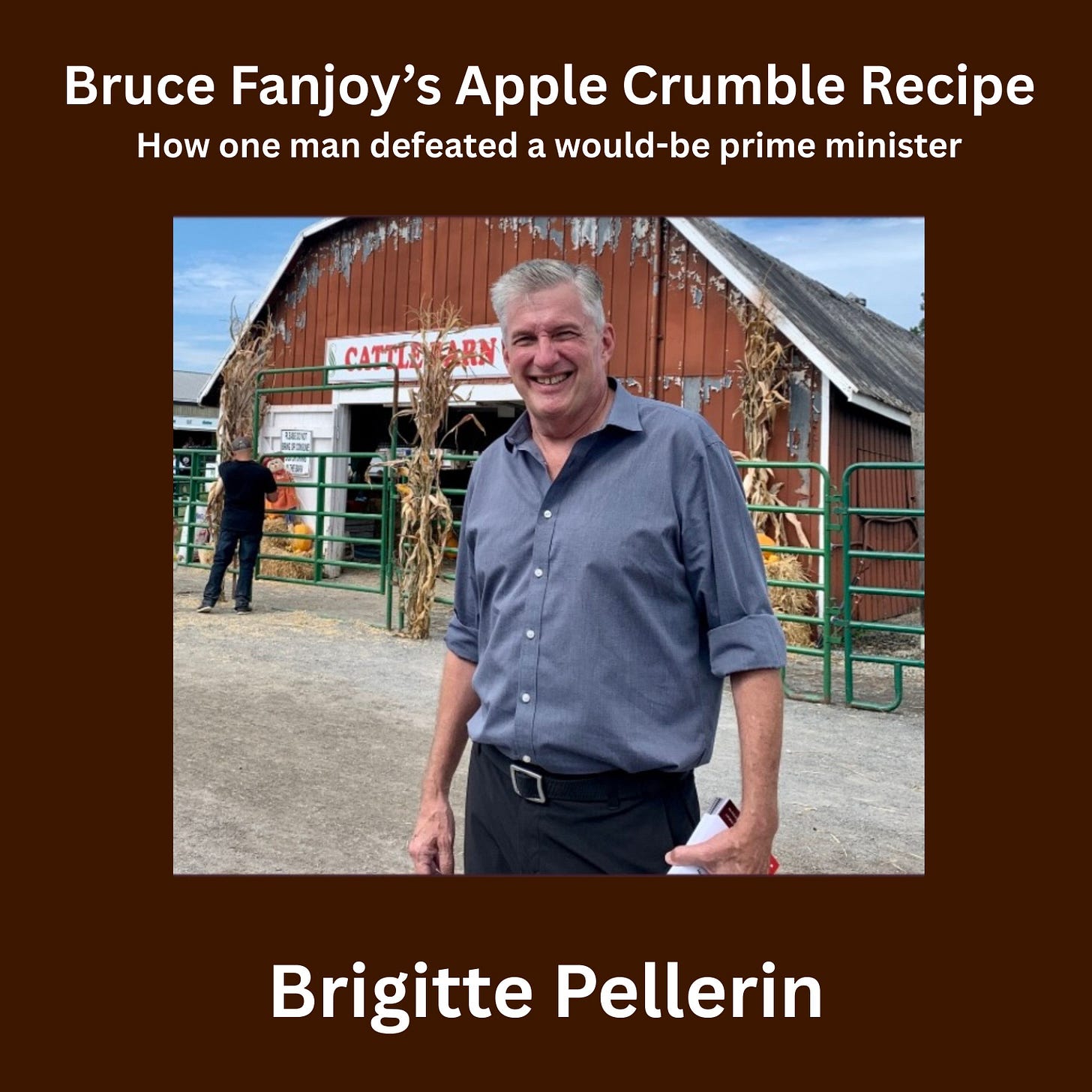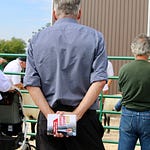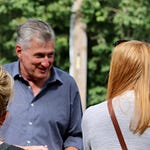The book is available in print, ebook and audio book formats.
Introduction
At the end of every big project, a book, a pregnancy, the year-end presentation that needs 17 drafts and six rounds of executive approval, there is a mixture of dread, anxiety, exhaustion, and elation. Also, pain. And if all goes well, a dash of joy and happiness.
Well, except for the presentation. That one’s just kind of dull.
But otherwise, here you are with your big feelings. Emotions that hit you when you’re at your most exhausted, with roughly none of the tools at hand to deal with all that adrenaline, and whatever other hormones our bodies produce in times of high intensity.
It doesn’t always look pretty.
At Bruce Fanjoy’s house in Manotick, on the night of the 2025 federal election, there was, in addition to the aforementioned mix of emotions, a lot of excitement as we waited for results in the riding of Carleton.
And waited.
And waited some more.
As you may remember that riding had been targeted by the Longest Ballot Committee, a loose organization of terminally unfunny yahoos determined to annoy everyone by adding dozens of last-minute pretend candidates to the ballot in order to convince Canadians that proportional representation would be better than first-past-the-post.
As I’ve written elsewhere, if there’s a sign of intelligent design at the root of this campaign, which had hit a few other ridings during earlier by-elections and had in particular cost the popular Liberal Leslie Church a victory in the very Liberal Toronto-St. Paul’s riding in downtown Toronto, it completely eludes me.
I spoke to the fellow behind the stunt during the 2025 campaign and asked him to explain the connection between putting dozens of people on a ballot and protesting first-past-the-post, and for the life of me I can’t see it.
First-past-the-post may very well be the worst way to elect people. Except for all the others, I guess. And certainly, the last time Justin Trudeau got a majority was in 2015, when he clearly promised to get rid of that system and replace it with something better, which could almost literally be anything different.
When he left office in early 2025, Trudeau was asked if he had any regrets, and abandoning his electoral reform promise was one he mentioned. I don’t think he ever appreciated just how many people in 2015 voted Liberal primarily for that. There is a ton of support throughout the country for electoral reform.
Not so much for the longest ballot idiocy. In Carleton in 2025, it gave Elections Canada a hard time without accomplishing anything useful, beyond reminding a bunch of GenXers that they can’t pull all-nighters like they used to.
Or maybe that’s just me? It took me a week to recover.
The final tally came in early morning. We’d spent the evening — night, whatever — in the living room and kitchen of the lovely Fanjoy home. It was Bruce and his family, along with members of his early team. There was food and all manner of fizzy water. A few of us had a little beer or wine. This wasn’t really a party. Not yet anyway.
At around 10 pm, the doorbell rang, and in came a few Fanjoy cousins who’d driven in from Toronto and New Brunswick to surprise the candidate. Bruce’s two adult children and their partners were there, too. His wife Donna and Red the dog (sporting a fetching Liberal red bowtie) tried not to show just how nervous they all were.
Me, I was mostly perched on a stool at the kitchen island typing away furiously. I’d promised my editor a column as soon as possible after the results were known. I would have to work on my patience. Of which I have approximately none.
Up until about the time the cousins showed up, it was a very ordinary story for an election night. A story that was happening in hundreds of kitchens, hotel rooms and community centres all over the country. Candidates waiting for results to come in, numbers on a television screen that determine what kind of life they and their family will lead in the next few years.
In the Fanjoy house, the story had the potential to be national. If the results confirmed our belief that Carleton was ready to say goodbye to Pierre Poilievre, its long-time MP, and reject his style of politics, Bruce would instantly be thrown into a media storm. There would be no coming back from that. For better or worse, if he won this very important seat, his life would change dramatically.
In our brains, we all understood the possibility that we might be wrong and that the story of Carleton would remain local. If Pierre Poilievre won an eighth consecutive election, nobody would remember Bruce Fanjoy and he could ease back into retirement, knowing he’d given it his all.
That’s what just about everyone in the business thought would happen. There wasn’t a commentator or pollster anywhere who thought Poilievre could lose. Until about a week before voting day. That’s when front-page newspaper stories appeared, claiming the Conservative Party was sending resources into Carleton because they were afraid of losing it. Which they denied, of course. That was to be expected. In a campaign, you never admit to being worried about a thing.
We laughed. We knew Conservatives had realized much too late that Bruce Fanjoy was entirely capable of taking Poilievre’s seat away. In our hearts, those of us who’d been with him since the beginning of this crazy adventure, knew he wasn’t going to lose.
Still, we were nervous. When the first Carleton results came in and he saw on the screen that he was ahead, Fanjoy’s eyes got a little misty. Holy shit, it was happening. Poilievre would never be in the lead once throughout the night. That must have burned.
As the evening wore on without anything resembling certainty for us, we alternated between sinking into the couch and pacing back and forth around the house. Every now and then someone pretended they needed to make a call and went outside to breathe different air and hear the roaring of the river at the edge of the property.
Nothing helped, not even spitting bits of chewed-up fingernails hither and yon. I do hope, for the sake of their backyard, that human nails make good compost.
At around midnight we made the trek, on foot, across the river and through the lovely centre of Manotick, to the Legion building.
I remember the people inside the Mill Tavern, which we passed on the way, didn’t seem too fussed with the election. They were drinking and laughing and having a grand old time. It felt a little bit surreal. Or maybe I was jealous of their freedom? They didn’t seem nervous in the slightest.
The room at the Legion was filled with supporters, campaign staff and volunteers, as well as many media folks, all packed in front of a massive TV screen. Bruce gave a short speech, shook plenty of hands, answered questions from journalists and then we all left to finish watching at his house.
Or, you know, not.
Family members who had to drive long distances departed early. The rest of us hung around, chomping on crudités and drinking sparkling water until we started germinating. We also demolished a poor, defenseless cheese platter. And apple crumble, of course. Bruce Fanjoy’s favourite dessert.
None of us wanted to abandon the watch party, but when the candidate announced, a bit past 3 am, that he was going to bed, we were out of there in a flash. He was right. It was time to sleep.
I drove myself home to Westboro and by the time I got there the count was still not final. But it was looking good, so I emailed my column to the newspaper with a note to the editor to please check against final results and I went to bed too.
I woke up to a winner less than three hours later. Over 80% of eligible voters showed up, and more than half of them voted for Bruce Fanjoy.
He had done it. He’d kicked Pierre Poilievre off his seat in Parliament. That chair, it turns out, belongs to the electors of Carleton, and they did not hesitate to choose a different, more positive occupant for it.
Bruce Fanjoy, the most unlikely rookie politician you’ve ever met, accomplished something that nobody with any experience in the business would have predicted: He defeated a party leader in his own riding. He took away the riding of the man who, four months earlier, had a 25-point lead in opinion polls and was widely assumed to be the next prime minister of Canada.
On election night — well, technically the morning after election night, you’ll forgive me, it was a bit of a blur — Poilievre became seat-less. And at the time of writing, in May 2025, his long-term future as leader of the party is anything but certain. For someone who’s literally never done anything else in life other than politics, the blow was undoubtedly felt very deeply. So much so that he forgot to call Fanjoy to congratulate him on his victory, as every defeated candidate does.
I wasn’t surprised. I’ve been covering federal politics since before Poilievre first got elected. I’ve seen him operate over two decades. Grace was never his strong suit.
Every expert in the country had dismissed the possibility that Poilievre might lose Carleton. He had represented the area without interruption since 2004, both in government under Stephen Harper and in opposition under various Liberal leaders, including 10 years of Justin Trudeau.
Poilievre was and still is the leader of the Conservative Party, but not the leader of the Opposition, since that person needs to be an MP. Overnight, this man who’d mastered all the dark arts of politics was a loser.
I joked to someone that the process of defeating Poilievre was like competing in a singing contest against Céline Dion. Everyone knows her and nobody knows you.
Bruce Fanjoy campaigned from behind the whole entire time. We knew all along that beating Pierre Poilievre wouldn’t just happen by chance or accident. It would take a lot of hard work, endless reserves of positivity, several pairs of shoes, incredible amounts of time, uncommon stubbornness, countless volunteers, many financial donations, and most of all an unshakable belief that decency and human kindness can and should triumph over Trumpian toxicity.
The evening had an additional dimension for me, all to do with where we were sitting. The house is the reason I first got to know Bruce Fanjoy, but it is also a symbol of who the man is and why he was especially suited to the role he would play in the campaign.
The house is both a dream that would have felt impossible 20 years ago and a concrete example of how Fanjoy operates: First he thinks carefully about what needs to be done to accomplish what many would call a crazy, impossible goal, then he designs and executes the plan.
The Millview Passive House, as it is known on Twitter, has been on the platform I refuse to call X since before the pandemic. Back in the era when social media was cool.
These days the house’s account mostly amplifies its owner’s posts. Its first tweet, in December 2019, showed the foundations being laid on a lovely lot abutting the Rideau River right across from Watson’s Mill, a historic building that’s been standing since before Confederation and still makes flour today.
The mill is in the part of Manotick where Pierre Poilievre had his constituency office, and one thing the team had a great deal of fun with is that the sign with Poilievre’s name on it was sitting on the ground near the front door the whole time Bruce Fanjoy was campaigning.
I guess it was on purpose, given how easy it is to hang a sign. Right? I can’t think of a reason why anyone would think it’s a good idea to have your nameplate sit in the dirt like that, but what do I know. We had a good time with it because even the most positive campaign is allowed to enjoy a chuckle here and there.
The blue house that stands proudly on Millview today feels like any other comfortable home. You’d never be able to tell it was designed to be as close to net-zero as possible without freezing in the winter or boiling in the summer.
Bruce and his wife Donna enjoy enough privilege to be able to build such a house from the ground up and build it right. They’ll be the first to acknowledge that.
But as Bruce will tell you until he’s green about the gills, anyone can do a little something to reduce their carbon footprint, regardless of income or economic status. Even if it’s as simple as making the effort to use less plastic or updating the insulation on doors and windows.
That’s one measure of the man right there. If politics is the art of the possible, Fanjoy’s art is to push gently on people to make what’s possible bigger tomorrow than it is today. Little by little, bit by bit, when you keep pushing for more possibilities, they really do increase.
Some people call this incrementalism. One of Pierre Poilievre’s predecessors as Conservative leader, the one who actually won elections (excuse the temporary meanness), was especially good at incrementalism. That’s one reason Stephen Harper is still a very popular former prime minister among right-wing and centre-right Canadians. He made changes slowly, one little bit at a time. But he left his mark on the country.
Being in his early 60s, Fanjoy has matured enough to know that grand reforms aren’t easy to sell, but manageable changes are. And if you keep making enough small changes, you’ll accomplish something special. He would likely agree that knowing what’s possible but continuing to push for more is the best, most practical way to get to the desired outcome.
Oh, and making sure we don’t take any giant steps backwards, such as advocating for no price on carbon or for more dependence on oil and gas.












